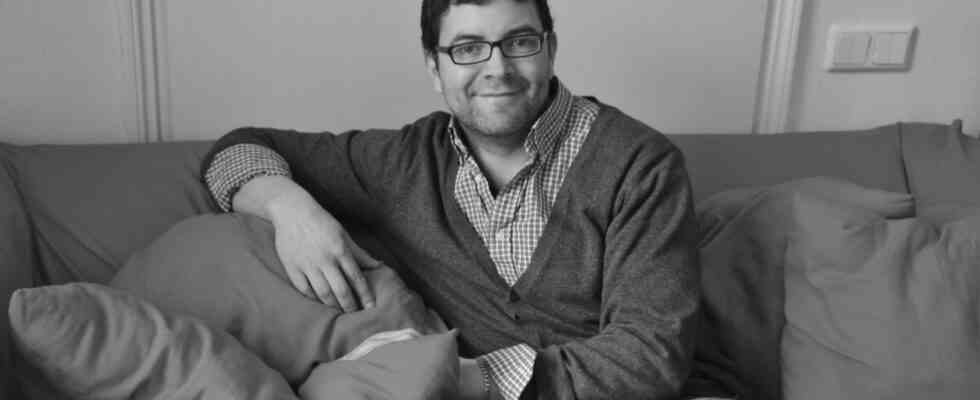Most of the time you can’t choose. Max Dorner’s guardian angel, for example. Clearly a beginner, otherwise he would have saved Dorner from developing multiple sclerosis. On the other hand, he could never blame him: “After all, my guardian angel would have liked to have had a simpler case than me to start with.” Max Dorner liked to look at you with such sentences with his own mixture of melancholy seriousness and dimpled humor.
Munich itself lost a kind of guardian angel over the weekend. Max Dorner has died. As a reporter you have to keep your composure, but this report hits a lot of people in the city as if they had run into a concrete post at full speed.
For his debut novel “The First Summer” he received the Bavarian Art Promotion Prize
Up until 2006, Dorner’s biography sounded like a promising multi-talent – and who knows whether, if he hadn’t been ill, he might not have become an opera director, as much as he loved great drama, Wagner’s “Ring” and Italian bel canto. He studied dramaturgy at the Bavarian Theater Academy, and received the Bavarian Art Promotion Prize for his debut novel “The First Summer”, which is set in Munich in 1945.
At the age of 33, he noticed for the first time during a yoga class that something was wrong with his body. “You go in healthy and come out with MS.” Shortly before, he had made a pilgrimage from Munich to Rome on foot, when suddenly he could hardly manage the landing to his apartment.
“My demon is a couch potato” was published in 2008, the first of five books that deal with being ill without misery being displayed or anyone licking their wounds. Rather, Max Dorner writes about the things that affect us all like a kind of emotional anthropologist who tackles basic emotional states from different sides and only dares to go further than most: In 2015, at the TEDx conference in Munich, he asked in the packed hall: “Which one of you is lonely?” Nobody answered. That’s when he started talking about loneliness itself, and you could feel in the dark how people around you realized that this was about them all.
Max Dorner was allergic to the company’s noodle salad from the Kulturschickeria
Max Dorner was allergic to the factory noodle salad of the cultural chic and with his wheelchair gave as wide a berth as possible to all the adabeis who pollute this city so thoroughly. At the same time he became gentler over the years, with himself and with others. But maybe he would have intervened at this point because he had an infallible kitsch detector. So instead, an anecdote: Once, in the café around the corner from him, the older waitress behind the counter grumbled, only bringing what he had ordered provocatively slowly. But Max Dorner said: I love that, finally someone who doesn’t let himself be rushed.
It must have often been a great misery, but he never showed it. Instead of sinking into self-pity, he preferred to set up a publishing house or, as Captain Wheelchair in the comedy program with actress Susanne Plassmann, proved that you can make good jokes about your own disability. He set up a kind of authors’ get-together called “Sarabande” or organized solidarity readings for Liu Xiaobo, who was imprisoned in distant China, from his ground floor apartment in the west end.
Max Dorner later tried to give as many other people as possible access to spaces that would otherwise have remained closed to them: Dorner has represented art and inclusion in the cultural department since 2015 and racked his brain every day about how people with disabilities can become artistically active and participate themselves can. With gentle vehemence, Dorner has enabled many inclusive theater projects or art projects for autistic people.
He called his photos of broken elevators at S-Bahn and U-Bahn stations “Islands of Silence”.
At some point, the mirror was missing from Max Dorner’s bathroom. Instead, it said in his black handwriting, “I’m beautiful.” – Life is often so rough, the world of such ignorant ugliness that Dorner saw it as his duty to retaliate with humor and pragmatism. In the degrading parcours that wheelchair users have to cope with almost every day (cobblestones, sloping footpaths, stairways), he always found all the broken lifts at the S-Bahn and U-Bahn stations the most humiliating. But instead of just ranting around (which he was quite capable of), he collected photos of the lifts in a kind of self-defense reflex, called the whole thing “Islands of Silence”, and thus reinterpreted these situations of shameful helplessness into moments of autonomy and inner concentration: “Standing in front of a broken lift gives you the feeling of being in front of the holy of holies. It is unreachable and yet so close, it is the connection between this world and the heaviness of the earth.”
In the night from Friday to Saturday, Max Dorner died unexpectedly in his sleep at the age of 49. He leaves behind his man Serhat, his parents, his sister Sally and a large circle of friends with a now gaping empty center.

